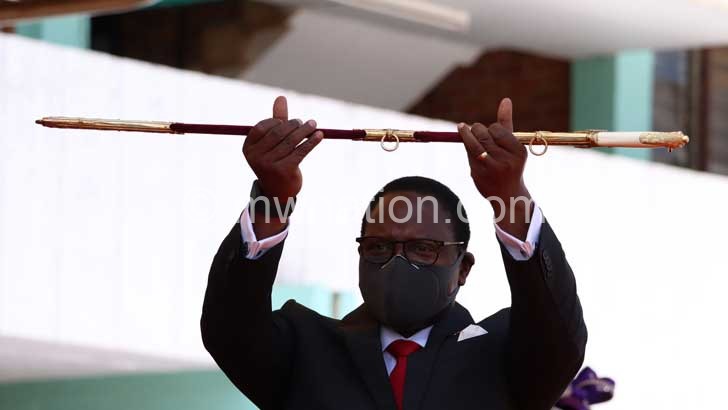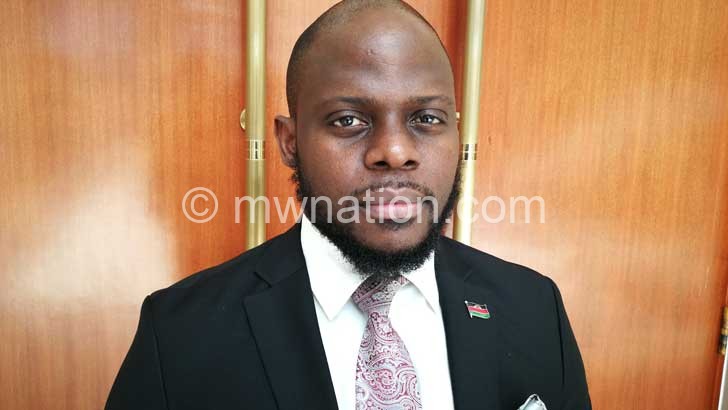chakwera charms
President Lazarus Chakwera’s inauguration speech has inspired analysts and citizens alike who agree it offers hope to rebuild the country, but some suggest he should have specified time frame for implementation.
In his speech delivered yesterday at Kamuzu Barracks parade ground in Lilongwe after getting the sword of command to become Commander-in-Chief of Malawi Defence Force, Malawi’s sixth President made bold and big promises, including fighting corruption, empowering oversight and governance institutions, declaring assets and responding to questions from legislators in Parliament.
He also promised to operationalise the Access To Information Act passed in 2016, but was left to gather dust ever since. He also appealed for hard work and said rebuilding Malawi is the responsibility of everyone.
In a speech that has earned praises as inspiring hope on most social media platforms, Chakwera said: “There can be no new Malawi if the only people to build it are Chakwera and [Vice-President Saulos] Chilima. No!
“So long as I am President, I will insist that no new Malawi must be built except that which is built by Malawians. The collective ownership of our problems and collective participation in fixing them is the bedrock of our Tonse philosophy.
“When we promise to create one million jobs, we do not just mean that we will create programmes to employ you, but also that we will challenge you to stop seeing yourself as a job seeker and start seeing yourself as a job creator.

“When we promise to ensure that every household is able to eat three meals a day, we do not just mean that we will give you cheap fertiliser to increase food production, but also that we will challenge you to work three times as hard in your fields as before.”
Reacting to the address, political scientist Boniface Dulani said the speech was “very inspiring”. He said he was impressed with Chakwera’s commitment to appear before Parliament and answer questions, to declare assets every year, to trim presidential powers and to implement ATI law.
He said: “But I was disappointed that there was no mention of APM [former president Peter Mutharika] as a way of acknowledging the 1.7 million people who voted for the old man.
“We have heard similar speeches before only to be disappointed later. I remain optimistic with this presidency. But as they say, the proof of the pudding is in the eating.”
Dulani, who teaches at Chancellor College—a constituent college of the University of Malawi—and is a researcher with Institute for Policy and Research, said it was also interesting how Tonse had “become a governing philosophy and it sounds so natural”.
On his part, Henry Chingaipe, a prominent governance expert, described the speech as “stately and befitting for the governance and development trajectory that this country deserves”.
He said: “Candid in its pessimism of the diagnosis of the status quo and how we got here; explicit and progressive in its optimism of the prescription that has the potential to take us to a desired state.
“We expect to experience active leadership as opposed to a laissez faire approach of APM; accountable and responsive government. ‘Clearing the rubble to fix the ruins’ so that we can rebuild. Inspirational and very stately speech.”
Naile Salima, a Lilongwe-based woman who watched the speech on television, said: “It was a generally a good speech giving us a glimpse of where we are coming from and a vision of where we are going and as a nation.”
But she said she could have loved to hear the President assigning a time frame for his specific promises for accountability’s sake.
Said Salima: “For example, he has highlighted that he will trim presidential powers. At what point in his presidency do we hold him accountable on this? After a year or after five years?”
Charity Kalowa, a woman living in the high density Mtandire Township, said she listened to the speech on radio from her workplace and singled out the call for all Malawians to help in building a new Malawi.
“What has impressed me most is the message that we shouldn’t leave things in his and Chilima’s hands. We should all take a part, I think that was very clear and moving,” she said.
Prior to delivering his speech, Chakwera inspected his first guard of honour as Commander-in-Chief of the armed forces after receiving the symbolic sword of command from Malawi Defence Force Commander General Peter Mathanga. The military gave him a 21-gun salute in the background.
The event was restricted to 100 attendees after Chakwera cancelled at the eleventh hour initial plans to combine his inauguration with the 56th Independence Anniversary Celebrations at Bingu National Stadium. The President said on Sunday the decision was made to reduce the risk of further spread of coronavirus among the 20 000 who were set to attend the event at the 40 000-capacity stadium.
Every effort was taken to ensure adherence to coronavirus preventive measures, including washing hands with soap, social distancing and wearing of masks.
Dignitaries included Tanzania Vice-President and representatives of leaders of Botswana, Kenya, Zimbabwe and Zambia. Diplomats representing their respective countries and organisations were also in attendance.
There were also no partisan political colours in sight at the parade grounds.
In his address, Chakwera, 65, thanked 47-year-old Chilima, the lawyers who represented the duo in the historic presidential election nullification petition case, judges, the citizens who marched, military and police, the journalists and the new Malawi Electoral Commission.
He said the ‘Tonse Philosophy’ was the cornerstone and governing philosophy of a new era for the country—a philosophy he said would deliver the country from its current state of “ruins”.
Chakwera, who alongside Chilima passionately condemned corruption during both the May 21 2019 Tripartite Elections and the June 23 fresh presidential election campaigns, said the country should do away with corruption, laziness, passivism, donor dependency, regionalism, negativity, impunity, unprofessionalism and incompetence.
He said: “The ruining of national treasures of both nature and state is a sin of my generation that I am bound by God to confess and bound by you to correct.”
In a marked departure from his predecessors, Chakwera said the failures of the past 26 years of democracy were collective failure and called for collective solutions.
His immediate predecessor Mutharika did not attend the ceremony to hand over the sword. This was not a surprise as Malawians only witnessed once in 2004 an outgoing president handing over power when Bakili Muluzi handed over to Bingu wa Mutharika. The gesture was, however, expected as Muluzi and Bingu belonged to the same party then.
In an interview, former president Joyce Banda said she had agreed with Muluzi to stay away from the event because of the threat of Covid-19 as both are of advanced age.
She said: “The only reason I didn’t go was because the President told me that the cancellation was due to Covid-19 and I discussed with former president Muluzi that we should stay away because of our age. Both of us are over 70.”
Banda described Chakwera’s speech as the best she has ever heard, and urged the country to rally behind the vision.
In a separate interview, Muluzi also hailed the speech, saying he was impressed by Chakwera’s call for Malawians to work hard.
He said: “We need to support the President to achieve his desired goals.”
Read Chakwera’s full speech on Page 6





